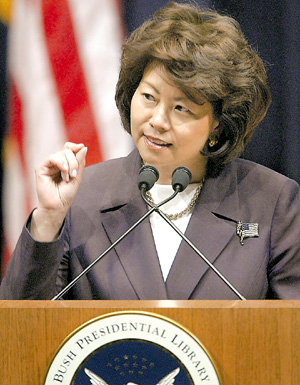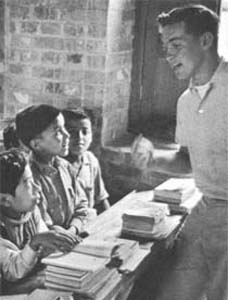
An Interview with Elaine Chao
HUMAN EVENTS Interview:
Labor Sec. Chao: Lasting Legacy of Reform
Posted Apr 15, 2005
Labor Secretary Elaine Chao inherited a department with a bloated budget in 2001, and in each year since, she has taken steps to streamline services for the 21st Century workforce.
One of Chao's top priorities is making the process for obtaining worker-training grants more competitive. Her department is also in the midst of congressional reauthorization of the Workforce Investment Act.
Chao recently spoke to HUMAN EVENTS editors Terence Jeffrey, John Gizzi and Robert Bluey about these issues.
You've served four years as Secretary of Labor. What has been your greatest accomplishment?
CHAO: I am very proud of my team. They're courageous, they're principled, and they're smart. We are probably one of the most active departments. We have tackled many difficult and long-standing issues.
We have been able to strengthen overtime protection for 6.7 million working Americans. The regulations governing white-collar exemptions under Section 541 of the Fair Labor Standards Act had not been changed since 1949, when Elvis was a teenager. The ambiguity gave rise to record numbers of class-action lawsuits in the workplace. Every administration since Jimmy Carter's has tried to update and modernize these regulations. President George W. Bush's administration is the first one that has succeeded.
So you've seen a diminution in the lawsuits as a result?
CHAO: We believe that in the long run that will be the results of these changes. If the government is asking the regulated community to comply with the law, the government has a responsibility--at the very minimum--to make clear what the law requires.
We also were successful in completing several other important regulations. The previous administration put out a regulation that would allow states to dip into the unemployment insurance fund to pay for paid parental leave. That was a concern to us because it essentially turned the unemployment insurance trust fund into a bank to pay for programs completely unrelated to unemployment. We believed that it was inappropriate to divert money from a fund that helps people at the most vulnerable period of their lives to pay benefits to people who are voluntarily absent from the workforce.
We have also opened up the grant process to competition. We believe the best services could be obtained if we threw open the doors and allowed more groups and organizations to compete for the billions of dollars we give out in grants.
One of the things I've learned throughout my career in government, the public and non-profit sectors, is that you must pay attention to the long-term impact of what you're doing. It would be regrettable to leave the government without having made long-term, systemic changes.
Do these cover, for example, worker-training programs?
CHAO: One example is the Older Americans Act, which has provided about $300 million to the same nine organizations--a process that started in 1967. We have opened that up to grant competition.
How much aggregate are we talking about in terms of money that contractors can bid on?
CHAO: Hundreds of millions, billions, basically.
And in this one area of procurement, you have more than $300 million that for years was going out to the same nine organizations?
CHAO: Right.
So these were basically quasi-government operations?
CHAO: We thought the recipients of these program services needed to have the best possible services available. That could only be assured through a competitive process.
They need to get in and compete for the money?
CHAO: They have to understand the process. Anyone can compete for these grants. To help with that process, we have actually established workshops that will acquaint all newcomers with the grants process and how to apply.
Are those groups regularly audited by the Department of Labor?
CHAO: There is a performance evaluation system, but it measures more process than outcomes. This is one of the goals the department and the administration is trying to foster and cultivate in the reauthorization of what's called the Workforce Investment Act. We feel that the recipients and clients of government programs deserve the best possible service. But these programs need to be evaluated to measure their effectiveness and their reach. May I also add that we get a lot of earmarks, too, which we must carry out.
Do you have any idea how much of your budget gets earmarked for members of Congress like that?
CHAO: Well, across the department we'd say as much as $160 million of our budget is earmarked by Congress.
So as much as $160 million is force-fed to specific organizations. Are those groups audited by the government?
CHAO: There are performance evaluation programs.
But that's different than actually looking at their books?
CHAO: Yes. There are thousands of grantees. And also remember that under the Workforce Investment Act, a lot of this is sent out by formula.
So the states are handing out the money?
CHAO: Of these monies, 5% stays at the department and the governor at the state level gets about 15%. The rest goes into the cities' and the counties' budgets.
The budget of the Department of Labor is approximately $50 billion. We are a very compassionate nation. We care about people who are going through a very vulnerable time in their life when they are out of work. Of this $50 billion, about $11.5 billion is discretionary, the rest is mandatory. The mandatory part is unemployment insurance, which goes up when the unemployed population increases.
But most of our budget goes to training--to what's called the Employment Training Administration. This is the part of the department that funds training. The department is a flow-through, basically. It goes through at the state level and it goes directly to the workforce investment system, which is overseen by a nationwide system of boards whose members are selected by local mayors and county commissioners.
Do you believe this program is potentially open to abuse given the level of oversight?
CHAO: There's more than $3 billion in unemployment insurance overpayments. We do have a fraud prevention and abuse system and, of course, the inspector general gets involved as well.
You think the government is losing more than $3 billion in fraudulent unemployment insurance?
CHAO: It's in total overpayments, of which about a quarter is fraud. We're addressing both of these issues.
If I may ask about the budget, each year you have been secretary the department has requested less money.
CHAO: The Department of Labor is probably one of the very few departments in which the budget today is less than what it was in fiscal 2002.
Do you see some reasonable way for some sort of comprehensive reform of the Labor Department budget and these grants we've been talking about?
CHAO: One of the administration's major initiatives is the reauthorization of the Workforce Investment Act. This administration is very committed to helping people who are going through a vulnerable period in their lifetimes. And the American people are very compassionate about the amount of tax dollars that we spend to help people get unemployment insurance and the training they need to access well-paying jobs in high-growth industries. But we can also make this program work better. Right now, for example, there are new jobs being created that are seeking workers and can't find them. That's because many workers don't have the skills. We need to match workers with the jobs that are available now so we can close the skills gap. We are trying to build more flexibility into the system so the demands of local labor markets can be addressed as well as more accountability. There have to be real performance measures.
Do you see the reauthorization as an opportunity to dramatically increase the effectiveness of this program?
CHAO: I think the workforce investment system does a nice job. But we need to do more. We need to challenge the workforce investment system more because there are people out there relying upon the services that the system provides, and we owe them the best help that can be provided, and we owe the taxpayers an effective system that gets real results for the dollars spent.















